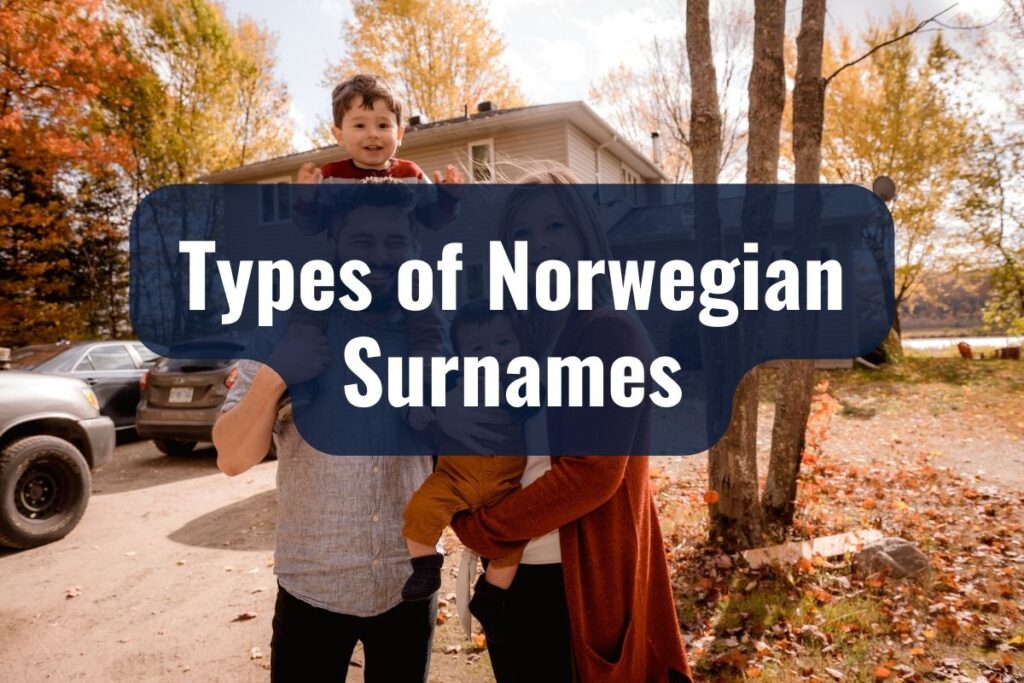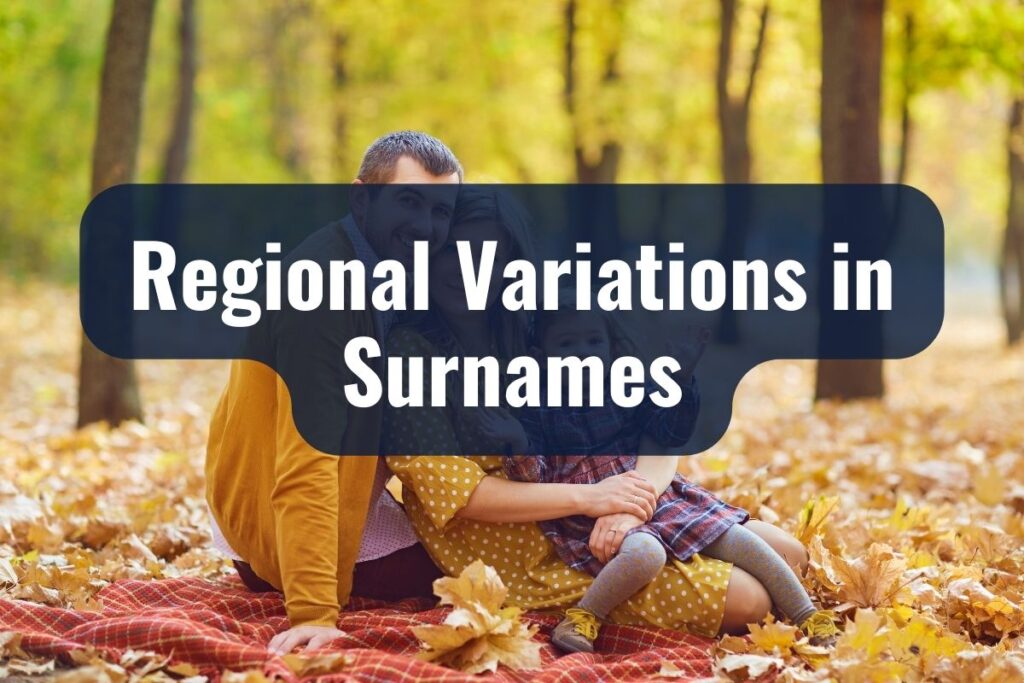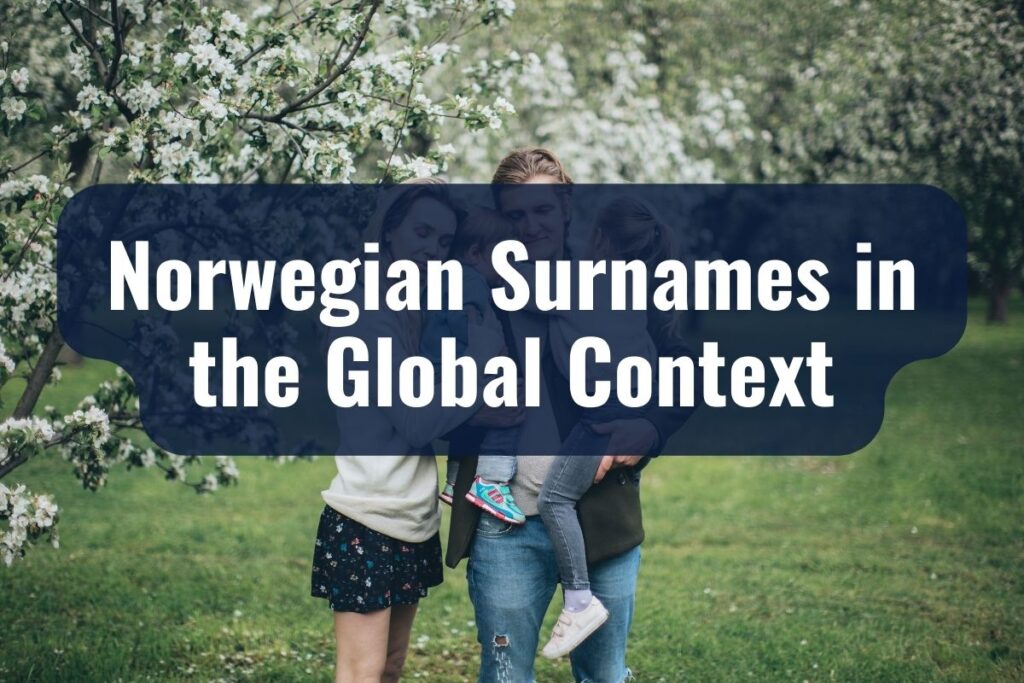Norway is known for its stunning landscapes, deep-rooted traditions, and unique linguistic heritage. An integral part of this cultural fabric is the Norwegian naming system, particularly surnames, which carry with them stories of ancestry, occupation, geography, and family history.
Surnames in Norway, much like in other parts of the world, are not merely identifiers but are deeply entrenched in the country’s social and historical milieu. They offer a window into the past, reflecting the lives, occupations, and geographical origins of ancestors. These names, passed down through generations, are like threads in the larger tapestry of Norwegian society, connecting individuals to their family’s past and the nation’s cultural heritage.
In this exploration of common Norwegian surnames, we delve into their origins, meanings, and the stories they tell. This article aims to provide an informative and straightforward guide, offering both historical and cultural insights into these names that resonate so deeply in Norwegian life.
Key Takeaways
- Norwegian surnames reflect history, occupation, and geography.
- Patronymic/matronymic systems were predominant historically.
- Surnames vary regionally, echoing Norway’s diverse landscape.
- Norwegian surnames globally signify cultural diaspora.
- Choosing a Norwegian surname involves cultural respect and legal awareness.
- Numerous resources aid in exploring Norwegian surnames.
The Origin and History of Norwegian Surnames
The history of Norwegian surnames is a mosaic of influences, reflecting the country’s evolving social and cultural landscapes. Initially, Norse naming traditions dominated, deeply rooted in the Viking era and the Old Norse language. These early names were typically simple, often composed of elements reflecting physical characteristics, traits, or one’s environment.
Transition from Patronymic/Matronymic Systems
A significant shift in Norwegian naming conventions occurred with the gradual move away from the patronymic and matronymic systems. These systems, which involved creating a surname based on the father’s (patronymic) or mother’s (matronymic) first name, were prevalent until the late 19th and early 20th centuries. For example, a person named Erik whose father was named Olav might be known as Erik Olavsson, indicating ‘Erik, son of Olav’. Similarly, a daughter named Ingrid with a mother named Anna might be Ingrid Annasdatter, or ‘Ingrid, daughter of Anna’.
Adoption of Permanent Family Surnames
The adoption of permanent family surnames, influenced by European trends and administrative needs, began in earnest in the 1800s. This shift was partly due to the increasing importance of formal record-keeping and identification as Norwegian society became more structured and bureaucratic.
Historical Periods and Naming Conventions
Throughout different historical periods, Norwegian surnames have been influenced by various factors, including:
- Viking and Medieval Influences: These periods saw the use of descriptive and occupational names, often vivid and illustrative of one’s profession or characteristics.
- Danish Rule (1380-1814): The long period of Danish influence over Norway brought in some Danish naming practices, although many traditional Norse names remained in use.
- National Romanticism (19th Century): A cultural movement emphasizing Norwegian identity and heritage led to a resurgence and preservation of traditional Norse names and the creation of new, uniquely Norwegian surnames.
Types of Norwegian Surnames

Norwegian surnames, rich in variety and meaning, can be broadly categorized into several types. Each category reflects a different aspect of Norwegian life, be it familial connections, occupations, or the natural landscape.
| Type | Description | Examples |
| Patronymic/Matronymic | Surnames derived from parents’ names, indicating lineage. | Hansen (son of Hans), Ingrid Annasdatter (daughter of Anna) |
| Occupational | Reflect ancestors’ professions. | Smed (Smith), Møller (Miller) |
| Geographic/Topographic | Based on landscape features or locations. | Dahl (valley), Haugen (hill), Strand (beach) |
| Ornamental | Created for their pleasant connotations, often without familial ties. | Fjellvang (mountain meadow), Solvik (sun bay) |
Patronymic and Matronymic Surnames
These surnames, derived from a parent’s first name, were once the norm in Norway. A patronymic surname, formed by adding ‘-sen’ (son) or ‘-datter’ (daughter) to the father’s first name, was common. For instance, ‘Hansen’ would imply ‘Hans’s son’. Similarly, matronymic names, though less common, followed the same pattern, using the mother’s name.
Occupational Surnames
Reflecting the profession of an ancestor, occupational surnames provide insights into the societal roles of historical times. Examples include ‘Smed’ (Smith), indicating a blacksmith, and ‘Møller’ (Miller), referring to a miller. These names were often adopted by families whose ancestors were renowned for their professions.
Geographic or Topographic Surnames
These surnames are derived from geographic features or locations, illustrating a deep connection with the natural landscape. Names like ‘Dahl’ (valley), ‘Haugen’ (hill), or ‘Strand’ (beach) are indicative of the family’s origin or residence near these features. Norway’s diverse landscape, from coastal areas to mountainous regions, has significantly influenced this naming convention.
Ornamental Surnames
A relatively newer category, ornamental surnames were often adopted during the 19th and 20th centuries. These are typically compound names, combining two Norwegian words to create a meaningful and sometimes picturesque surname. Examples include ‘Fjellvang’ (mountain meadow) and ‘Solvik’ (sun bay). These names were often chosen for their pleasant or desirable connotations and do not necessarily have a familial or geographic connection.
Most Common Norwegian Surnames
Norwegian surnames are as varied as the country’s landscapes, each carrying its own unique story and significance. Below are some of the most common Norwegian surnames, along with brief explanations of their possible meanings or origins:
- Hansen – A classic patronymic surname, ‘Hansen’ means ‘son of Hans’. It’s one of the most widespread surnames in Norway, reflecting the popularity of the name Hans in past generations.
- Johansen – Similar to Hansen, ‘Johansen’ translates to ‘son of Johan’. This name also follows the patronymic tradition and is prevalent throughout Norway.
- Olsen – Meaning ‘son of Ole’, this surname is another common patronymic name. Ole has been a popular first name in Norway for centuries, contributing to the prevalence of this surname.
- Larsen – ‘Larsen’ signifies ‘son of Lars’, a name of Scandinavian origin. It’s a testament to the enduring popularity of the name Lars in Norway.
- Andersen – This surname means ‘son of Anders’. Derived from the Greek name Andreas, it shows the influence of broader European culture on Norwegian naming practices.
- Pedersen – Translating to ‘son of Peder’, this surname is widespread in Norway. Peder is a Norwegian variant of the name Peter.
- Nilsen – Meaning ‘son of Nils’, a Scandinavian form of Nicholas, this surname reflects the integration of Christian names into Norwegian culture.
- Kristiansen – Signifying ‘son of Kristian’, it’s a common surname that illustrates the influence of Christian names, where Kristian is derived from Christian.
- Jensen – A patronymic surname meaning ‘son of Jens’, a variant of the name Johannes or John. It’s a testament to the enduring legacy of biblical names in Norwegian culture.
- Karlsen – Meaning ‘son of Karl’, this name indicates the popularity of the name Karl (Scandinavian for Charles) in Norway.
Regional Variations in Surnames

Norway’s diverse geography, from its rugged coastlines to deep fjords and expansive forests, has played a significant role in shaping the regional variations in surnames. These variations offer a fascinating glimpse into how location and local customs can influence naming practices.
Northern Norway
Coastal Influence: In the northern regions, surnames often reflect the maritime culture. Names like ‘Isaksen’ (son of Isak) and ‘Havnes’ (port or harbor) are common, indicating a strong connection to the sea.
Sami Influence: In areas with a significant Sami population, surnames might incorporate elements from the Sami language or culture, adding to the region’s unique naming tapestry.
Western Norway
Fjord and Mountain Names: Surnames in Western Norway often draw from the dramatic landscape of fjords and mountains. Examples include ‘Fjell’ (mountain), ‘Vik’ (bay), and ‘Aasen’ (ridge or hill).
Farming Heritage: Reflecting the region’s agricultural heritage, surnames like ‘Bakke’ (hill or slope) and ‘Hauge’ (mound or small hill) are prevalent, denoting features of the farmland.
Eastern Norway
Urban and Rural Distinctions: In urban areas, more diverse surnames are found, reflecting immigration and historical influences. In contrast, rural surnames often relate to local farms or landscapes, like ‘Lund’ (grove) or ‘Strand’ (beach or shore).
Historical Influences: Names like ‘Bergersen’ (son of Berger), ‘Gundersen’ (son of Gunder), and ‘Halvorsen’ (son of Halvor) are common, showcasing traditional Norwegian first names.
Southern Norway
Maritime Names: Reflecting the region’s strong seafaring tradition, names like ‘Thorsen’ (son of Thor, often associated with sailors) and ‘Moen’ (meadow, often associated with coastal plains) are common.
Danish Influence: Due to historical ties, there’s a noticeable Danish influence in surnames, with names like ‘Danielsen’ (son of Daniel) and ‘Jørgensen’ (son of Jørgen).
Trøndelag
Old Norse Influence: This central region retains strong ties to Old Norse traditions, with surnames often derived from Norse mythology or ancient Norwegian kings, such as ‘Erikson’ (son of Erik) or ‘Sigurdsson’ (son of Sigurd).
Sápmi
Indigenous Names: In areas traditionally inhabited by the Sami people, surnames may incorporate elements unique to the Sami language and culture, distinct from the typical Norwegian naming patterns.
Cultural Significance of Surnames
Surnames in Norway are much more than mere labels; they are symbols of heritage, history, and identity. Understanding their cultural significance offers a deeper insight into the Norwegian way of life and the values that shape it.
Reflection of Family Heritage
Connection to Ancestors: Surnames in Norway often carry stories and legacies of ancestors. They serve as a link to past generations, reflecting their lives, professions, or the places they called home.
Preservation of Lineage: Through surnames, familial lines and histories are preserved, allowing individuals to trace their roots and maintain a connection with their lineage.
Role in Society
Social Identification: Surnames provide a sense of identity and belonging, often indicating one’s place of origin, family profession, or ancestral lineage.
Cultural Continuity: The use of traditional naming practices, like patronymic surnames, underscores the importance of continuity and respect for cultural norms in Norwegian society.
Expression of National Identity
Symbol of Cultural Heritage: Surnames reflect the rich tapestry of Norway’s history, from the Viking age to modern times. They embody the nation’s journey through different historical epochs.
Embrace of Tradition and Modernity: While many Norwegians still follow traditional naming patterns, the evolving nature of surnames also reflects Norway’s openness to change and modern influences.
Role in Folklore and Literature
Storytelling and Mythology: Norwegian surnames often feature in folklore and literature, where they add depth to characters and settings, anchoring them in a specific cultural or historical context.
Preservation of Language and Dialects: Through surnames, the richness of the Norwegian language and its various dialects are preserved and celebrated.
Norwegian Surnames in the Global Context

The story of Norwegian surnames does not end at the borders of Norway. In the global context, these names tell tales of migration, cultural exchange, and the spread of Norwegian heritage across the world.
Spread through Immigration
Diaspora: Norwegian surnames have traveled far and wide, primarily due to immigration to countries like the United States, Canada, and Australia. These surnames, carried by individuals and families, have planted roots in new soils, bringing a piece of Norwegian heritage to diverse cultures.
Historical Waves of Migration: Significant historical events, such as the great emigrations from Norway in the 19th and early 20th centuries, led to the dispersion of Norwegian surnames. These names often carry with them stories of hope, resilience, and the search for a better life.
Influence on Local Cultures
Cultural Integration: In countries with substantial Norwegian immigrant populations, Norwegian surnames have become part of the local cultural tapestry. They are often seen in business, politics, and community leadership, reflecting the integration and influence of Norwegian descendants.
Preservation of Identity: For many descendants of Norwegian immigrants, retaining their original family surnames is a way of preserving their ancestral identity and staying connected to their roots, despite being far from Norway.
Variations and Adaptations
Changes in Spelling and Pronunciation: In adapting to new languages and cultures, some Norwegian surnames have undergone changes. These modifications may involve spelling adjustments to fit local phonetics or simplifications for ease of pronunciation.
Dual Identity: Many individuals with Norwegian surnames outside Norway navigate a dual identity, merging their Norwegian heritage with the culture of their resident country. This creates a unique blend of traditions and values.
Global Recognition and Interest
Interest in Genealogy: The global spread of Norwegian surnames has sparked interest in genealogy and ancestral research, with many individuals seeking to explore their Norwegian roots.
Cultural Exchanges: Norwegian surnames abroad often lead to cultural exchanges, fostering a deeper understanding and appreciation of Norwegian culture among diverse populations.
Related: Norwegian Male Names: The Story Behind The Names
Guidance for Expectant Parents and Cultural Enthusiasts
Choosing a surname for a child, especially in the context of honoring Norwegian heritage, can be a meaningful decision. For expectant parents and those with a keen interest in Scandinavian culture, understanding the nuances of Norwegian surnames is crucial. Here are some considerations and tips:
Considerations When Choosing a Norwegian Surname
Cultural Significance: Understanding the history and meaning of a surname can add depth to the choice. It’s not just a name; it’s a piece of heritage that the child will carry forward.
Family Connections: Consider the significance of the name within your family. Choosing a surname that has been passed down through generations can strengthen familial bonds and honor ancestors.
Pronunciation and Spelling
Ease of Pronunciation: If residing outside Norway, consider how the surname will be pronounced in the local language. A name that is easily pronounceable can help in avoiding mispronunciations and simplifying the child’s social interactions.
Spelling Considerations: Be mindful of the spelling, especially if it includes letters or characters unique to the Norwegian alphabet, like æ, ø, or å. Adaptations may be necessary to suit the linguistic norms of your country.
Respecting Norwegian Naming Laws
Legal Guidelines: Norway has specific laws regarding naming. If the child will have legal ties to Norway, it’s important to ensure that the chosen surname complies with these laws, especially regarding the use of patronymic/matronymic forms.
The Cultural Significance of Carrying a Norwegian Surname
Identity and Heritage: A Norwegian surname can be a powerful symbol of identity and connection to Norwegian culture and history.
Global Context: In a globalized world, a distinctively Norwegian surname can evoke curiosity and appreciation for cultural diversity.
Additional Resources
- Digitalarkivet (The Digital Archives of Norway): An invaluable resource for anyone interested in Norwegian genealogy. It offers access to a wealth of historical records, including census data and church records, which can be crucial for tracing family lineage and understanding the origins of surnames.
- Norwegian Naming Laws and Databases: Websites detailing Norwegian naming conventions and laws can provide insights into the current and historical practices around surnames in Norway.
- Books on Norwegian History and Culture: Numerous books delve into the history of Norway, including its naming practices. These can provide a broader context for understanding the evolution and significance of surnames.
- Academic Journals and Articles: Academic resources often offer detailed studies on Norwegian surnames, their origins, and their meanings, providing a more scholarly perspective.
- Norwegian Language Courses and Tutorials: Learning the basics of the Norwegian language can aid in understanding the pronunciation and meaning of surnames.
- Dictionaries and Language Guides: Resources that focus on Norwegian phonetics and orthography can be especially helpful for those not familiar with the language.


